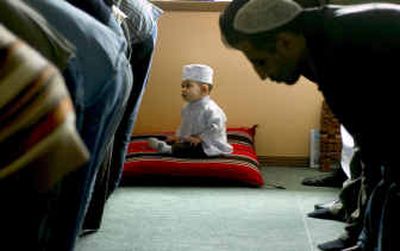Quran report pains Muslims

Even before she touches Islam’s holy book, Fatima Ansari of Mead washes her face, her arms all the way up to her elbows, her head and then her feet.
In order to read the Quran, Ansari has to be in a purified state – not just physically, but with her heart and mind focused on God – or Allah.
The Quran is more than just a book to followers of Islam, she said. It is a sacred text – the word of Allah, unaltered for 1,400 years in its original Arabic prose. “The Quran is a miracle,” she said. “It is the miracle of our prophet, peace be upon him.”
So, like other Muslims all over the world, Ansari felt both hurt and shocked to learn that U.S. interrogators in Guantanamo Bay had allegedly desecrated the holy book by flushing it down the toilet.
Newsweek magazine has since retracted its controversial 200-word report that included those allegations. But conversations continue among the area’s Muslim community, especially in the wake of anti-American riots that resulted in at least 17 deaths.
While many Muslims in Spokane do not condone the violence, some say it’s important to understand the circumstances of the people who reacted with such anger as a result of the alleged desecration.
Many are poor, oppressed and live in war-torn areas, Ansari pointed out. “It’s hard for me to say because I’m here in Spokane,” she said. “What happened (in Afghanistan) was a sign of desperation.”
Culture can sometimes govern how people react, said Sayed Daoud of Pullman, a member of Mosjed al-Farouq, a mosque in the Palouse area. In the United States, those who are angered by the alleged flushing can write letters to the president or their elected officials. But in Pakistan and Afghanistan, people don’t have that option.
The desecration of a holy book – whether it be the Quran, the Bible or the Jewish Torah – should never be tolerated, said Daoud.
“As an American, it is offensive to the bone,” he said. “You don’t have to be Muslim to deplore this action. It’s not part of our values as Americans. As human beings, we can’t condone any act of desecration against any sacred book.”
For Afghans, Pakistanis and others who also may know people in Guantanamo, the outrage they felt also was heightened by the fact that they had long suspected acts of horror committed against prisoners, said Daoud.
“If it (the desecration) did happen, then it was a hateful thing to do,” said Saleh El-Giadi, a longtime Spokane resident and one of about 50 men who gathered for prayers Friday at the Spokane Islamic Center.
He and others at the mosque treat the Quran with such profound respect that they gasp in horror at the thought of their holy book being thrown across a room or stomped on or even brought inside a bathroom.
Some people keep the Quran on a special stand in their homes. Others wrap it in white linen or another special cover. If it is placed among other books, the Quran is put on top of the stack and never on the bottom. Many Muslims memorize parts of the holy book, line by line, as a way to show their reverence and to heighten their own spirituality. Thousands have even learned all 114 suras – or chapters – by heart.
Followers of Islam believe Allah revealed the Quran to the prophet, Muhammad, through the angel Gabriel. Muhammad could not read or write, explained Ansari, but was able to recite the rich prose when it was bestowed upon him. That’s one of the reasons why the Quran is considered a miracle, she said.
Since Newsweek reported the alleged Quran flushing on May 9, several American Muslim organizations have responded by asking adherents to write letters to the president and Congress, demanding an investigation of possible detainee abuse and the human rights practices of U.S. military and intelligence officers.
The Council on American-Islamic Relations recently launched a campaign called “Explore the Quran” by distributing free English translations of the book to anyone interested.
“In today’s climate of heightened religious sensitivities and cultural clashes, now is the time for people of all faiths to better acquaint themselves with Islam’s sacred text, the Holy Quran,” said CAIR executive director Nihad Awad.
Elnour Hamad of Spokane also was offended by the report that interrogators had allegedly desecrated the Quran, but he thinks the reaction in Afghanistan was “blown out of proportion.” He believes some of the people who were involved in the demonstrations were incited by the rhetoric of extremists who wanted to fan the violence and deepen anti-American sentiments.
“Extremism is not unique to Muslims,” noted Hamad, a Sufi Muslim and native of Sudan. “You must remember that the majority of Muslims are moderate and peaceful people.”
Despite statements from the U.S. Secretary of State’s office that declared “disrespect for the holy Quran is not now, nor has it ever been, nor will it ever be, tolerated by the United States,” Hamad said there is a possibility that the incident did indeed take place.
In fact, CNN and other media have reported that the International Committee of the Red Cross has gathered “credible” reports about U.S. personnel at the Guantanamo Bay naval base disrespecting the Quran and raised the issue with the Pentagon several times.
Consider the atrocities committed at Abu Ghraib, said Hamad, who has delivered lectures on the inconsistencies of U.S. foreign policy.
Desecrating the Quran – which is “spiritual torture” – is wrong, just like any other form of abuse committed against prisoners, he said.
“If we are really serious about promoting democracy all over the world, we need to exercise it first in our own conduct,” said Hamad. “Torture of any kind is a violation of human rights.”